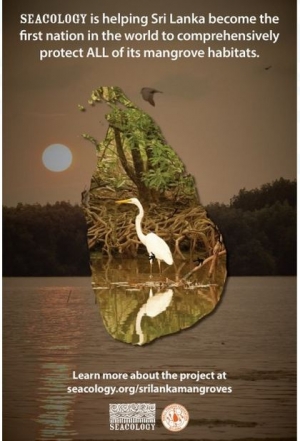Sri Lanka announces nationwide protection for mangrove forests
Location: Colombo, Sri Lanka. 12th May 2015
This article is from the original press release entitled "Seacology launches nationwide mangrove project in Sri Lanka" and is available for viewing at the Seacology website, http://www.seacology.org/uncategorized/seacology-launches-nationwide-mangrove-project-in-sri-lanka/
At the press conference launching the joint programme, Sri Lanka President Maithreepala Sirisena stated, “It is the responsibility and the necessity of all government institutions, private institutions, non government organisations, researchers, intelligentsia, and civil community to be united to protect the mangrove ecosystem. I highly appreciate and admire the joint effort made by the international non-governmental organizations Seacology and the Small Fishers Federation of Lanka to conserve the mangrove ecosystem of Sri Lanka.”
Mangroves are tropical trees that have thick, stiltlike roots and grow in brackish swamps and shallow salt water. It is estimated that in the last 100 years, over half of the world’s mangroves have been lost and continue to be destroyed at a rate of about one percent per year. (www.habitat.noaa.gov/abouthabitat/mangroves.html)
Mangrove forests are vitally important for several reasons. They sequester three to five times more carbon per equivalent area than other types of forests (www.habitat.noaa.gov/coastalbluecarbon.html) and thus play an important role in helping mitigate climate change. Their root systems serve as nurseries for many species of fish that go on to populate coral reefs. Mangrove forests additionally provide a key buffer, greatly decreasing damage caused by tsunamis, hurricanes and other storms.
The project will cost US$ 3.4 million over the next five years. Seacology has already raised approximately half of this amount. This project will protect all 21,782 acres (8,815 ha) of Sri Lanka’s existing mangrove forests by providing alternative job training and microloans to 15,000 impoverished women who live in 1,500 small communities adjacent to this nation’s mangrove forests. The project will also replant 9,600 acres (3,885 ha) of mangrove forests that have been cut down. In exchange for receiving these microloans to start up small businesses, all 1,500 communities will be responsible for protecting an average of 21 acres of mangrove forest. A first-of-its-kind mangrove museum to educate the public about the importance of preserving this resource will be constructed as part of this project.
While no charitable funds will be given to the government of Sri Lanka, the project will play an important role in this effort by demarcating mangrove areas and publishing forest information in official government journals. This will provide legal protection for all of Sri Lanka’s mangroves and will mandate rangers to patrol mangrove forests.
“Seacology has worked for over two years putting this project together,” said Duane Silverstein, executive director of Seacology. “We believe that it will serve as a model of protection of mangrove forests and the blue carbon they harbor for other nations to emulate.”
Anuradha Wickramasinghe, chairman of Sudeesa, stated, “We are thrilled to play a part in this groundbreaking effort that not only protects Sri Lanka’s mangrove forests but also helps some of Sri Lanka’s poorest citizens find sustainable livelihoods.”
Seacology protects the marine and terrestrial environments of islands – the site of over half of all plant and animal extinctions in recorded history – throughout the world. Since 1991, US-based Seacology has launched over 250 projects in 55 nations protecting over one million acres of threatened island habitat. Seacology has been widely recognized for its efforts. In a ceremony in Monaco, Prince Albert II recently honored Seacology for outstanding innovation.
Sri Lanka based NGO Sudeesa improves the quality of life for low income families by providing appropriate skills training and investments for environmentally-friendly vocations which safeguard Sri Lanka’s coastal ecosystems.

MFF NCB member in Sri Lanka Sudeesa is part of a nationwide ... , Colombo © Seacology, 2015